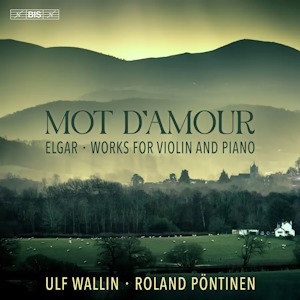
Sir Edward Elgar (1857-1934)
Mot d’amour
Ulf Wallin (violin)
Roland Pöntinen (piano)
rec. 2023, Stora Salen, Västerås Konserthus, Sweden
BIS BIS2659 SACD [57]
It’s discographically useful to have a near-hour long all-Elgar violin recital. The tendency these days is to feature the Elgar Sonata alongside a couple of equally strong late-Romantic works (Respighi, Franck) or to play it off against the Debussy or to include the Piano Quintet; there are many contrasts available, of course, including an option to include the Concerto. Ulf Wallin and Roland Pöntinen’s SACD reminds me of the old Nigel Kennedy LP in its approach – in fact Kennedy and Peter Pettinger included five of the small pieces, as well as the Sonata, in their still-splendid Chandos recording.
The Sonata receives a committed and stylistically apt reading notable for the employment of period-styled portamenti at strategic moments. The duo is excellent at melding the declamatory and the musing elements of the first movement – excellently balanced, by the way – in playing of suitably elastic confidence. The end of the first movement sounds a touch didactic and heavy, though. Wallin’s vibrato usage widens in the slow movement, and here, again, his portamenti offer tastefully succulent commentaries. I don’t find the phrasing fanciful enough, though, the pizzicati are downplayed and preface a more ordinary piece of late-Romanticism. I miss the wistful whimsicality that can be generated in other more savvy performances. Fortunately, Wallin and Pöntinen ensure that the reminiscence theme in the finale is taken forwardly and fluidly – so many duos linger too much here – but there is arguably a lack of cumulative energy as the sonata draws to a close.
The remainder of the programme is overwhelmingly devoted to the lighter and earlier Elgar. Here one feels the duo is freer to express the more open-hearted lyric elements of the music. Both the Chanson de nuit and Chanson de matin are accomplished and charming whilst Mot d’amour, the trinket that gives this album its title, is both little-known (though Kennedy and Pettinger recorded it) and attractive. Elgar’s first piece with opus number is the Romance in E minor, a notably un-Elgarian piece of Gallic warmth. Salut d’amour is sympathetic if very slightly laden with sugar; I prefer a rather more austere approach. Adieu is for solo piano though Szigeti arranged it for violin. The Allegretto on G-E-D-G-E is another rare example of Elgar’s whimsical but purposeful character pieces composed for a pupil (called Gedge). Sospiri is spic and span.
Most attractively balanced and recorded in Stora Salen, Västerås Konserthus this is a good release though not one that can be unreservedly recommended for the sonata.
Jonathan Woolf
Buying this recording via a link below generates revenue for MWI, which helps the site remain free


Contents
Violin Sonata in E minor, Op. 82 (1918)
Chanson de nuit, Op. 15: No. 1 (1889-90)
Chanson de matin, Op. 15: No. 2 (1889-90)
2 Pieces for Violin and Piano, Op. 13: No. 1 Mot d’amour (1889)
2 Pieces for Violin and Piano, Op. 13: No. 2 Bizarrerie (1889)
Romance in E Minor, Op. 1 (1878)
Salut d’amour, Op. 12 (1888)
Adieu, for piano solo (1932)
Allegretto on G-E-D-G-E (1888)
Sospiri, Op. 70 (1914)

















